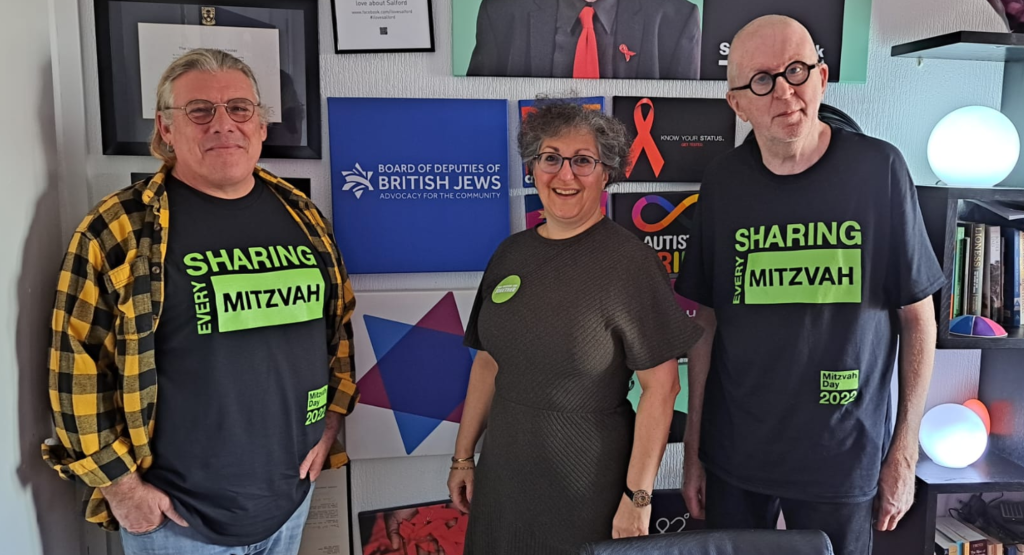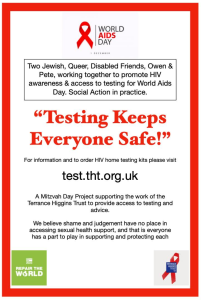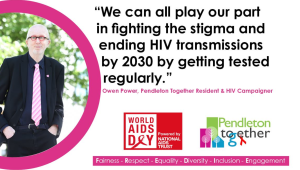
Two disabled men from Pendleton have made a plea encouraging at home HIV testing for World AIDS Day and to raise awareness for sexual health.
As of June 2023, England is on track to meet the ambition set by the former Health and Social Care Secretary Matt Hancock in January 2019 to reduce new HIV transmissions by 80 per cent in 2025 and end new HIV transmissions by 2030.
However, Owen Power and Pete Simms, both Jewish, disabled and queer, strongly feel there is still a stigma surrounding sexual health and therefore decided to promote home testing for HIV on World AIDS Day on December 1 as opposed to visiting a clinic.

In Judaism, on Mitzvah Day, despite its official date being November 19, Jews are encouraged throughout November and December to do good deeds and volunteer for one’s local community.
Owen Power, a deaf man and former training manager delivering government-funded schemes for people with disabilities, believes spreading awareness on sexual health can help the people of Salford during the Mitzvah period.
He has worked for 40 years to promote inclusion regarding sexual health, particularly for HIV prevention.
He said: “There’s so many advantages to home testing in the sense that no one needs to know you’re accessing the service. You just go online and order the kits.

“When you’re in the right frame of mind, you can do the test to find out for yourself rather than having to go to a clinic.”
Even though he “feels a sense of community involvement” after moving to Salford in 2001, Mr. Power believes “there’s so much progress, but not everyone realises it” when speaking about HIV prevention.
“There is still a great stigma attached to HIV, very unfortunately,” he added.
“I think people fear that they’d be ‘found out’ or that there’d be a great shame in accessing sexual health services.”
The evident lack of awareness on HIV testing in GPs and hospitals is an ongoing issue Mr. Power wants to eliminate, as he highlighted “there’s not a great deal of signposting in medical centres encouraging people to test.”

He continued: “When patients go to the GP to have a general health check-up, GPs will ask about their alcoholic intake, smoking and their exercise. But they would never, ever say ‘do you test for HIV?’.
“My dream is that testing becomes normalised in the sense that you can go along for a test in the same way you’d go for a flu jab or any routine check-up, and that there’s no big deal about it whatsoever.”
The man often supporting the public at Pendleton Gateway in Salford hopes HIV prevention can lead people to opening up conversations surrounding sexual health whilst “being realistic and not being ashamed, because there’s nothing to be ashamed about.”
Mr. Power recalls his early career in promoting HIV prevention, where, during the 1990s, he set up a project on HIV awareness using audio cassettes.

The determination to do so came after his ex-partner, a blind man, “had no access to information on what HIV and AIDs actually is” and was “totally frightened” in a time where an outbreak of the viruses was prominent.
Mr. Power also outlined the effects of the outbreak on disabled and gay people: “At the time, there was an absolutely enormous stigma attached to AIDs. It really inspired so much hate towards particularly gay men because it was pretty much considered the gay plague.
“I became aware that there was a terrible assumption that people with disabilities were not sexual beings and not sexually active, so there was no need for any information about sexual health.”
Launched during World AIDS Day in 1992, Mr. Power’s project saw success as the local health authority provided funding and support for his tireless efforts.
He said: “It made me realise, rather than sitting back and getting upset about the lack of information or access and this stigma, it was better to get involved and try to do something about it.
“We’re all sexual beings and we have a right to be safe and to talk about it, and we end up keeping each other safe.”
For free and low-cost HIV blood and oral self-testing kits from the charity Terrence Higgins Trust, click here.















Recent Comments